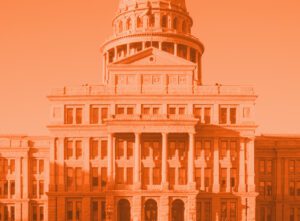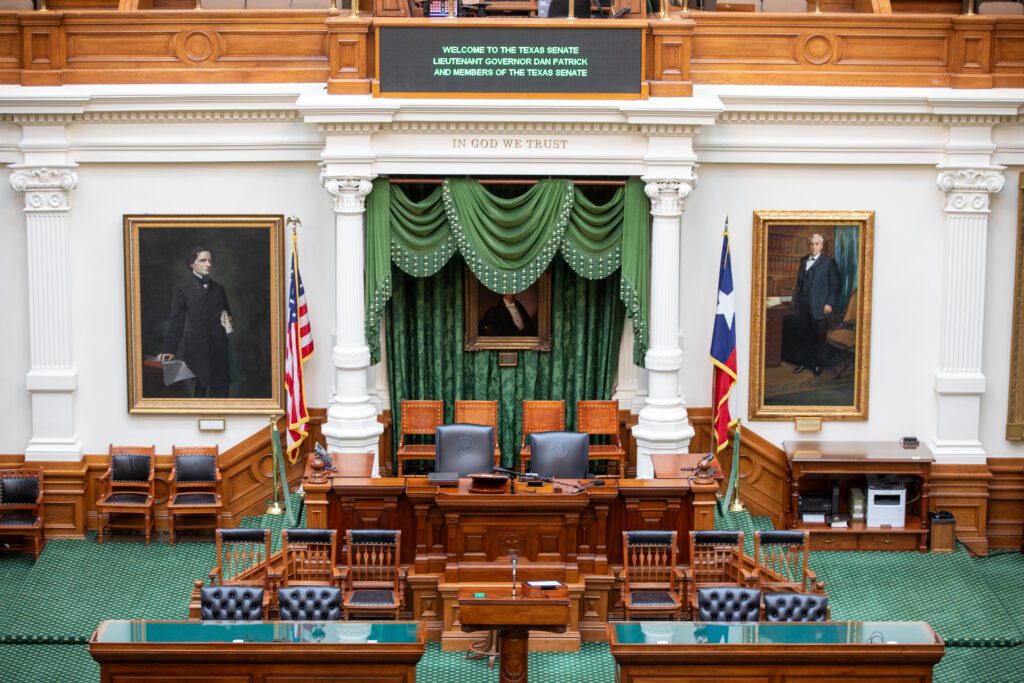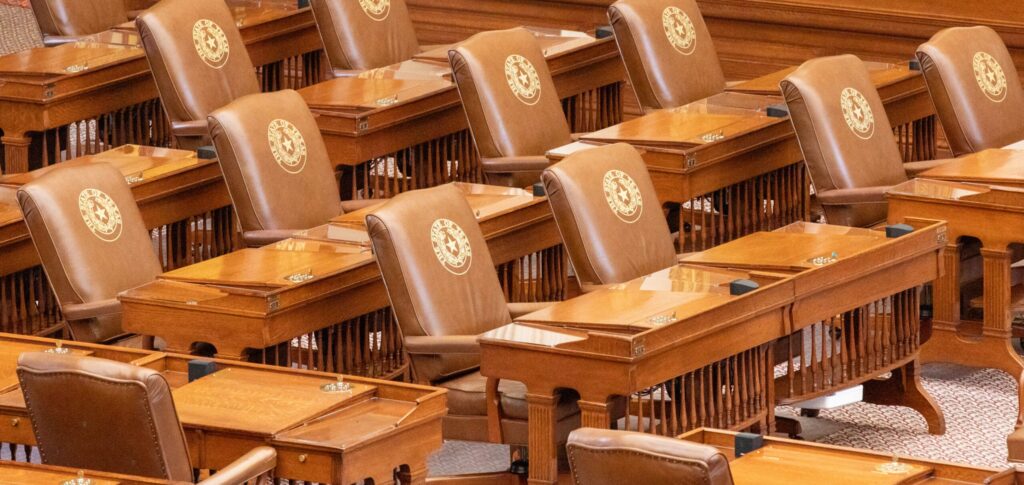
categories
What to Expect During the 2025 Texas Legislative Session

January 14, 2025
The 89th Legislative Session is underway, and legislators are now in Austin for the next 140 days to discuss our state’s most significant issues, and public education is at the top of the list. For public education advocates, this session presents opportunities to address challenges facing school districts throughout the state, including a lack of school funding, the need for more teacher pay, fully funding pre-K, and the opportunity to create a better assessment and accountability system.

What to Expect During the first 60 Days of the 89th Legislative Session
As the 89th Session kicks off, the Texas Comptroller released the Biennial Revenue Estimate, projecting $194.6 billion in funds available for general-purpose spending for the 2026-27 biennium—a 1.1% decrease from 2024-25 due to a smaller beginning balance. Despite this, revenue collections are expected to increase, offering opportunities for significant budget allocation. The election of the Speaker of the House will further shape the session’s direction, followed by committee assignments announced by the Lieutenant Governor. These early steps will lay the groundwork for the legislative agenda, paving the way for critical decisions in the months ahead.
A pivotal moment will be Governor Abbott’s State of the State Address, where he will outline his legislative priorities and emergency items for the session. Unlike other pieces of legislation, which cannot be passed until after Friday, March 14 – the 60th day of session – the Governor’s emergency items may bypass this regulation. In the last legislative session, the Governor highlighted education savings accounts (ESAs) as his number one emergency item.
Thousands of bills are filed in a single session—typically around 7,000—and approximately 1,000 of these will pertain to public education. However, remember that only about 10% of education bills usually make it through the entire legislative process.
The first 60 days of the legislative session are primarily dedicated to bill filing and committee hearings. As the session advances, floor debates become more intense, leading up to the final day, Sine Die, on June 2, 2025. Any bill that hasn’t passed both chambers by this date will not become law unless reconsidered during a Special Session called by the Governor.
2025 Legislative Session Quick Reference Timeline
- January 13: Biennial Revenue Estimate Day
- January 14: First day of 89th Legislative Session
- January 14: Speaker of the House Elected
- Mid-January: Senate committee appointments announced
- Late January to Early February: Governor Abbott’s State of the State Address
- Late January to Early February: House committee chairs and members announced
- March 14: Deadline to file bills
- March-May: House votes on the General Appropriations Act
- March-May: Committee meetings, floor debates, and conference committees
- June 2: Last day of 89th Legislative Session (Sine Die)
As the filing deadline approaches, the Capitol’s energy will grow, with House and Senate committees gearing up to review the many bills submitted. Expect hundreds of hours of testimony as state agencies, organizations, and passionate advocates converge to make their voices heard on crucial issues. By May, most bills will have either moved forward in committees or faced key deadlines that could affect their progress. Those that haven’t advanced face an uphill battle, as the final weeks of the session are marked by intense floor debates and votes to meet the rapidly approaching end-of-session deadlines.

Why This Matters for Public Education
These 140 days will be critical for advancing effective public policy in Texas. Keeping up with Texas’ legislative tempo will help you understand which bills will likely become law and how they will affect our schools.
For more details on how bills become laws, you can read The Legislative Process in Texas by the Texas Legislative Council.
Raise Your Hand Texas 2025 Legislative Priorities
Raise Your Hand Texas has outlined key priorities for the upcoming session, focusing on four main areas: school funding, teacher workforce, pre-kindergarten, and assessment and accountability. Here’s a look at our policy recommendations:
School Funding
Texas public schools currently face unprecedented financial challenges, including record inflation, the end of federal stimulus funding, declining enrollment, and increased safety requirements. The last increase to the Basic Allotment occurred in 2019, but with inflationary pressures, schools effectively have $1,300 less per student than they did five years ago. These funding shortages force districts to adopt deficit budgets, cut essential programs, and in some cases, consider closing campuses.
Our policy recommendations aim to address these challenges:
- Increase state funding for public school students and education programs, prioritizing raising teacher pay.
- Implement an automatic annual adjustment to the Basic Allotment to reflect inflation and growing student needs.
- Reinvest state savings from local school district property value growth back into public schools.
Teacher Workforce
Texas teachers are the backbone of our education system, directly impacting student success. However, challenges in recruitment and retention are leading to teacher shortages, larger class sizes, and increased reliance on uncertified teachers.
Our policy recommendations to support the teacher workforce include:
- Provide increased compensation and benefits packages, aiming for a $15,000 increase to retain teachers.
- Invest in recruitment initiatives, including scholarships for aspiring teachers.
- Strengthen teacher development by raising the standards for preparation programs and offering meaningful professional development opportunities.
Pre-Kindergarten
Early education sets the foundation for lifelong success, but Texas still underfunds full-day pre-kindergarten programs, with state funding based on half-day attendance. This funding gap leaves districts to cover the additional costs and competes with other early education needs.
Our policy recommendations to improve pre-K access include:
- Fully fund pre-K programs based on full-day attendance.
- Expand the Early Education Allotment to cover pre-K students.
- Increase eligibility for pre-K programs, including raising income caps and extending eligibility to children of public school educators.
Assessment and Accountability
The current A-F accountability system overemphasizes standardized test scores, such as STAAR, failing to capture the full scope of what schools provide. It’s time to rethink our approach to evaluating school performance.
Our policy recommendations for assessments and accountability are:
- Expand the scope of Texas’ A-F accountability ratings system to include factors beyond STAAR test scores.
- Limit the weight of STAAR scores to 50% in accountability ratings.
- Remove all high-stakes testing consequences for high school students.
- Design and implement a formative assessment that informs instruction throughout the year without adding additional testing time.
Advocating for Public Education
The upcoming 89th Texas Legislative Session will be pivotal for public education, and Raise Your Hand Texas is committed to advocating for policies that benefit all 5.5 million public school students. These legislative priorities aim to strengthen Texas schools, support educators, and ensure that every child has access to high-quality education.Stay informed about the session and our advocacy efforts by subscribing to the Across the Lawn newsletter. If you are ready to advocate for public education, get in contact with your Raise Your Hand Texas Regional Advocacy Director. Together, we can shape the future of education in Texas.




